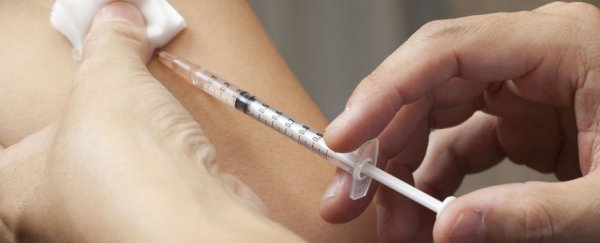Scientists have published the results of a phase 1 human trial on a new Ebola vaccine based on the 2014 strain, and suggest that not only is it safe to use, but it does what a good vaccine is supposed to - it provokes an immune response.
There are several different Ebola vaccines in development, by research institutions all over the world, but this is the first one to directly address the current strain of the virus.
The team, led by Fengcai Zhu from the Jiangsu Provincial Centre for Disease Prevention and Control in China, tested the vaccine in a trial involving 120 healthy Chinese adult volunteers. The volunteers were split into three groups and assigned either a placebo, a low dose of the vaccine, called the recombinant adenovirus type-5 vaccine, or a high dose.
After 28 days, the team reports in The Lancet that 38 of the 40 patients who received the low dose of the vaccine, and all 40 of those who received the high dose showed a positive immune response to the vaccine. The volunteers who received the high dose also ended up producing more antibodies in response than the low dose volunteers.
The major limitation of this study is that the researchers were not able to test if the immune response provoked by the vaccine would be enough to actually fight the Ebola virus and protect a person from contracting the disease. The team now plans to test in Africa, and aims to test the immune response for longer than the 28 days of this study. But they have a tough road ahead of them.
While no adverse side effects were found in the participants of the trial, previous research with the vaccine has shown that immunity to the virus vector used to deliver the drug could hinder its effectiveness, which is something the team will have to figure out. But they say that the fact that 100 percent of the volunteers who received the high dose responded positively to it means this issue is, at least partly, being circumvented by an increased dosage.
There's also the rather awkward issue that several studies on this type of vaccine has suggested that it could actually increase a person's risk of HIV acquisition, so they're going to have to reconcile this issue if future research proves this to be true.
"On the basis of our findings, we believe that the Ebola vaccine we assessed has some potential, and a significant advantage of this type of vaccine is that stable and much easier to store or transport in tropical areas with inadequate cold-chain capacity, such as Africa," Zhu said in a press release. "However, whether this candidate vaccine could become a final vaccine for widespread use against Ebola outbreaks is still uncertain, because of the issues of HIV-1 acquisition rates and the pre-existing immunity, especially in west Africa."
We're not there yet, but seeing as every other potential Ebola vaccine has been based on the 1976 outbreak strain, it's a great first step. Now we have to wait and see what results the trials in Africa bring.
